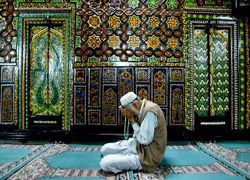Vowing I‘tikaaf
26/07/2010| IslamWeb
In a Hadeeth on the authority of ‘Umar ibn Al-Khattaab, may Allah be pleased with him, he said to the Prophet, ![]() “O Messenger of Allah, I vowed during the pre-Islamic era to perform I‘tikaaf for a night in Al-Masjid Al-Haraam.”The Prophet,
“O Messenger of Allah, I vowed during the pre-Islamic era to perform I‘tikaaf for a night in Al-Masjid Al-Haraam.”The Prophet, ![]() , said to him:“Fulfill your vow!Perform I‘tikaaf for a night”. [Al-Bukhari and Muslim]
, said to him:“Fulfill your vow!Perform I‘tikaaf for a night”. [Al-Bukhari and Muslim]
In another narration, ‘Umar ibn Al-Khattaab, may Allah be pleased with him, asked the Messenger of Allah,  , at Al-Ji‘irraanah on his way back from At-Taa’if,“O Messenger of Allah, I had taken a vow in the pre-Islamic era that I would observe I‘tikaaf for one day in Al-Masjid Al-Haraam, so what is your opinion?” He said:“Go and observe I‘tikaaf for a day.”[Al-Bukhari and Muslim]
, at Al-Ji‘irraanah on his way back from At-Taa’if,“O Messenger of Allah, I had taken a vow in the pre-Islamic era that I would observe I‘tikaaf for one day in Al-Masjid Al-Haraam, so what is your opinion?” He said:“Go and observe I‘tikaaf for a day.”[Al-Bukhari and Muslim]
Another narration reads, “When I embraced Islam, I asked the Prophet  about that and he said:‘fulfill your vow!’” [Al-Bayhaqi and Al-Bazzaar]
about that and he said:‘fulfill your vow!’” [Al-Bayhaqi and Al-Bazzaar]
Benefits and rulings:
First: Thevow and the I‘tikaaf were known to the people in the pre-Islamic era.
Second: Thepermissibility of fulfilling a vow after Islam if the person had taken it before Islam. Some scholars have said that it is in fact obligatory to fulfill such a vow.
Third: Thekeenness of ‘Umar, may Allah be pleased with him, to absolve and free himself from any liability because of a vow that he took in the pre-Islamic era. This indicates his piety and righteousness.
Fourth: Affirming the fulfillment of promises and avoiding breaking them. The Prophet,  , ordered ‘Umar, may Allah be pleased with him, to fulfill the vow though he took it in the pre-Islamic era.
, ordered ‘Umar, may Allah be pleased with him, to fulfill the vow though he took it in the pre-Islamic era.
Fifth: It is permissible to perform I‘tikaaf for a day or a night and this is understood from the apparent meaning of the Hadeeth.
Sixth: Those who say that it is permissible to perform I‘tikaaf without observing fasting support their opinion by this Hadeeth because the night is not a time for fasting.
Seventh: According to the scholars who say that it is permissible to perform I‘tikaaf without fasting — and this is the sounder opinion - it is permissible for the sick person who has the concession to break his fast to perform I‘tikaaf.
Eighth: One should ask scholars about what he does not know because ‘Umar, may Allah be pleased with him, asked the Prophet,  , about the ruling concerning that vow that he took upon himself in the pre-Islamic era. It is obligatory for the person asked to clarify the ruling and not to conceal it.
, about the ruling concerning that vow that he took upon himself in the pre-Islamic era. It is obligatory for the person asked to clarify the ruling and not to conceal it.
Ninth: Vowing to perform I‘tikaaf in any mosque other than the three Sacred Mosques; if this requires traveling, then, it is impermissible to do so because the Prophet,  , said: “No journey should be made except to three mosques” If it does not require traveling, then, it is permissible.
, said: “No journey should be made except to three mosques” If it does not require traveling, then, it is permissible.
www.islamweb.net

